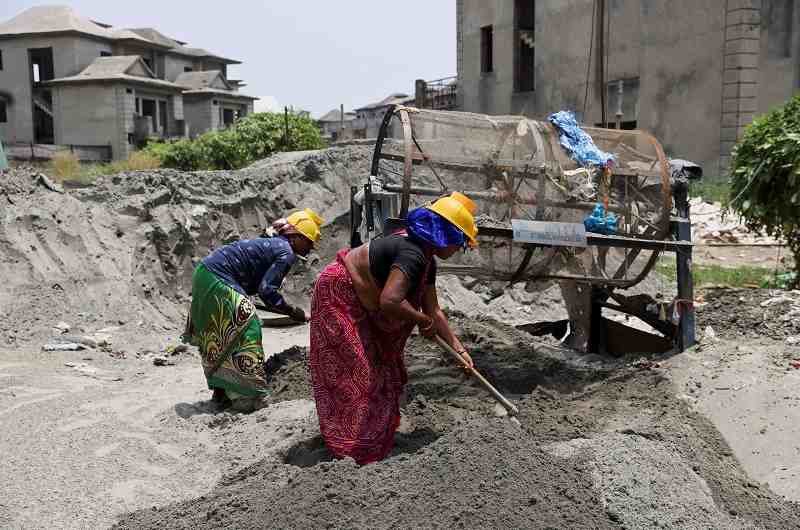
Laborers work at a construction site on a hot summer day in Noida, India, on May 12.
16:08 JST, June 18, 2022
NOIDA, India (Reuters) — For construction worker Yogendra Tundre, life at a building site on the outskirts of the Indian capital New Delhi is hard enough. This year, record high temperatures are making it unbearable.
As India grapples with an unprecedented heat wave, the country’s vast majority of poor workers, who generally work outdoors, are vulnerable to the scorching temperatures.
“There is too much heat and if we won’t work, what will we eat? For a few days, we work and then we sit idle for a few days because of tiredness and heat,” Tundre said.
High temperatures in the New Delhi area, which soared above 49 C in some regions on May 15, have often caused Tundre, and his wife Lata, who works at the same construction site, to fall sick. That in turn means they lose income.
“Because of heat, sometimes I don’t go to work. I take days off … many times, fall sick from dehydration and then require glucose bottles [intravenous fluids],” Lata said while standing outside their house, a temporary shanty with a tin roof.
Scientists have linked the early onset of an intense summer to climate change, and say more than a billion people in India and neighboring Pakistan are in some way at risk from the extreme heat.
India suffered its hottest March in more than 100 years and parts of the country experienced their highest temperatures on record in April.
Many places, including New Delhi, saw the temperature gauge top 40 C. More than two dozen people have died of suspected heatstrokes since late March, and power demand has hit multiyear highs.
Avikal Somvanshi, an urban environment researcher from India’s Centre for Science and Environment, said federal government data showed that heat stress was the most-common cause of death, after lightning, from forces of nature in the last 20 years.
Top Articles in News Services
-

Prudential Life Expected to Face Inspection over Fraud
-

Hong Kong Ex-Publisher Jimmy Lai’s Sentence Raises International Outcry as China Defends It
-

Japan’s Nikkei Stock Average Touches 58,000 as Yen, Jgbs Rally on Election Fallout (UPDATE 1)
-

Trump Names Former Federal Reserve Governor Warsh as the Next Fed Chair, Replacing Powell
-

Suzuki Overtakes Nissan as Japan’s Third‑Largest Automaker in 2025
JN ACCESS RANKING
-

Japan Institute to Use Domestic Commercial Optical Lattice Clock to Set Japan Standard Time
-

Israeli Ambassador to Japan Speaks about Japan’s Role in the Reconstruction of Gaza
-

Man Infected with Measles May Have Come in Contact with Many People in Tokyo, Went to Store, Restaurant Around When Symptoms Emerged
-

Prudential Life Insurance Plans to Fully Compensate for Damages Caused by Fraudulent Actions Without Waiting for Third-Party Committee Review
-

Woman with Measles Visited Hospital in Tokyo Multiple Times Before Being Diagnosed with Disease
























